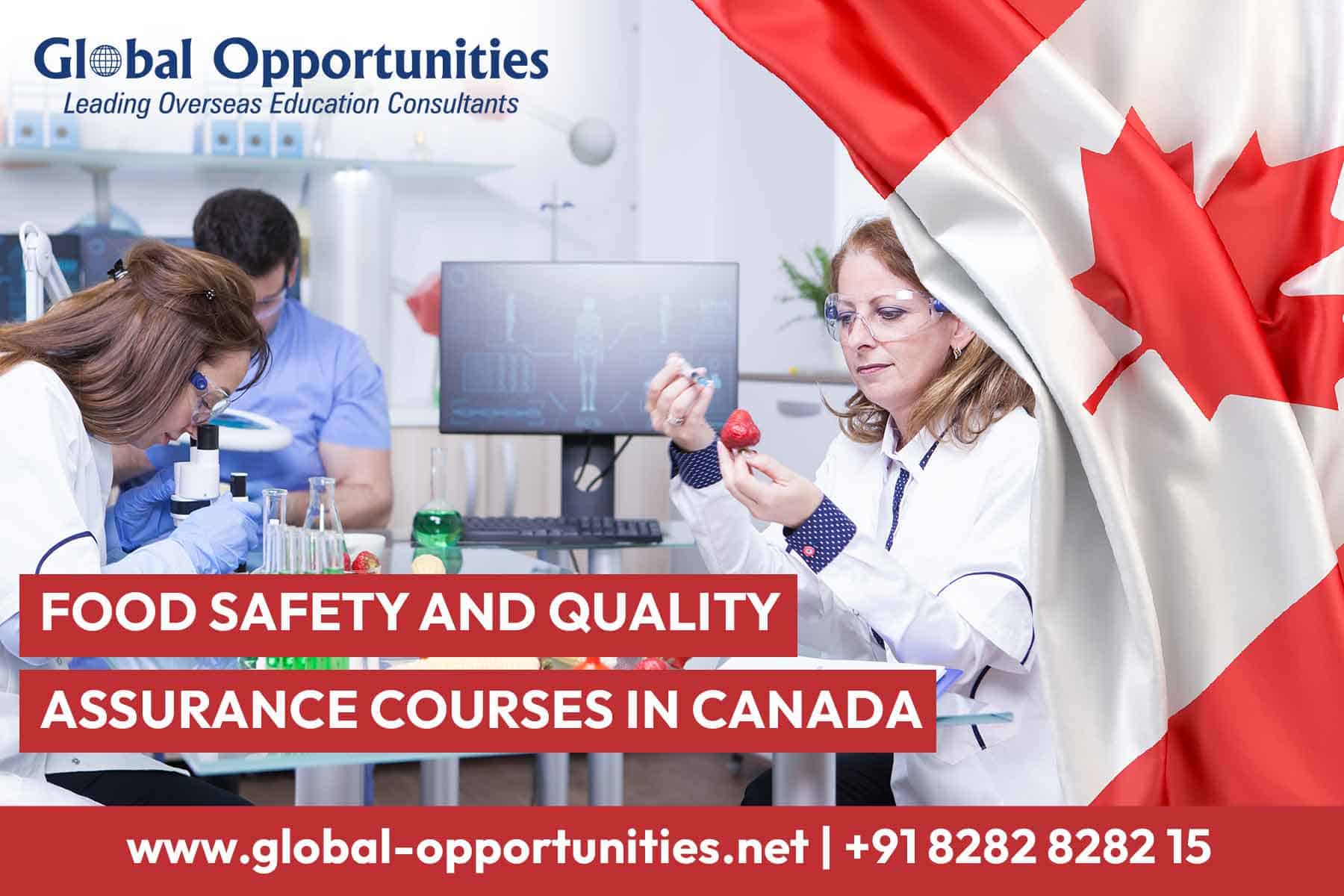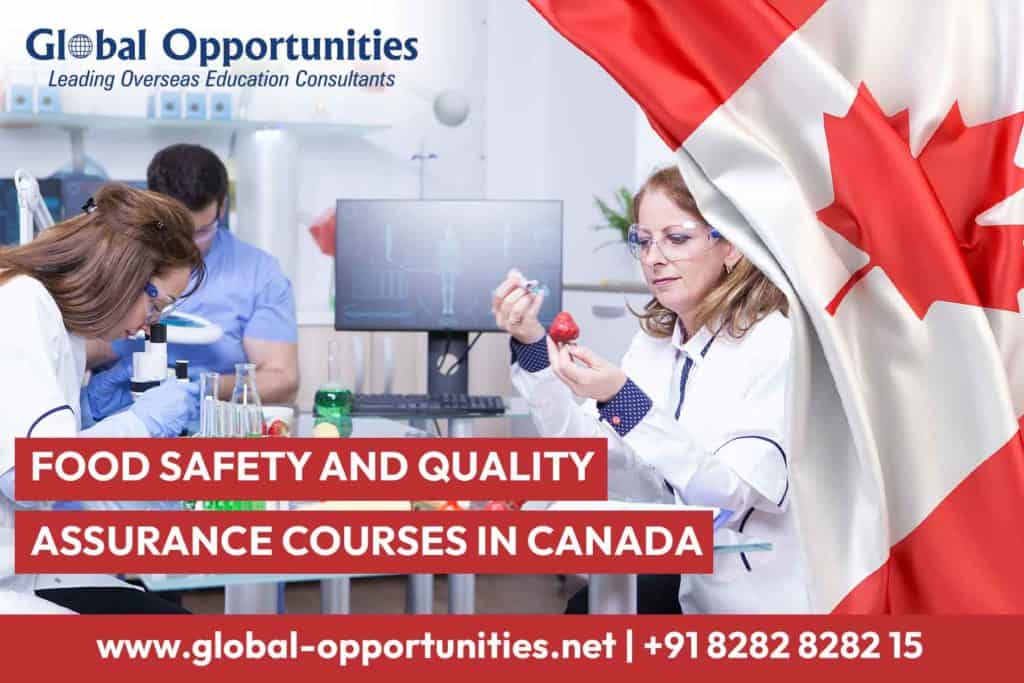Food Safety and Quality Assurance Courses in Canada

 Here in this article you will get to know about various Food Safety and Quality Assurance Courses in Canada. Courses in food safety and quality assurance in Canada are generally offered in the format of graduate certificate courses. As per the agriculture et Agroalimentaire in Canada “The food and beverage processing industry is the second largest manufacturing industry in Canada in terms of value of production with sales of goods manufactured worth $117.8 billion in 2019 and it accounts for 17% of total manufacturing sales and for 2% of the national Gross Domestic Product (GDP)”, As the demand for these food products rises and their processing continues, it becomes equally crucial to maintain quality control. This is why numerous Canadian universities provide courses in food safety and quality assurance.
Here in this article you will get to know about various Food Safety and Quality Assurance Courses in Canada. Courses in food safety and quality assurance in Canada are generally offered in the format of graduate certificate courses. As per the agriculture et Agroalimentaire in Canada “The food and beverage processing industry is the second largest manufacturing industry in Canada in terms of value of production with sales of goods manufactured worth $117.8 billion in 2019 and it accounts for 17% of total manufacturing sales and for 2% of the national Gross Domestic Product (GDP)”, As the demand for these food products rises and their processing continues, it becomes equally crucial to maintain quality control. This is why numerous Canadian universities provide courses in food safety and quality assurance.
The duration of food safety and quality assurance postgraduate courses in Canada for international students is for 2 years.
Some of the best food safety and quality assurance courses in Canadian universities are:
- Graduate Certificate at Food Safety & Quality Assurance
- Master of Science in Food Safety & Quality Assurance
- BSc Food Safety & Quality Program
- Diploma Program in Food Safety & Quality Assurance
- Advanced Diploma in Food Safety
Top Universities Providing Food Safety and Quality Assurance Courses
Some of the food safety and quality assurance related courses are:
| University Name | Degree Name | Location |
| Niagara College | Advanced Diploma in Culinary Innovation and Food Technology (Co-op) | Welland, Canada |
| Centennial College | Advanced Diploma in Food Science Technology (Fast Track) (Optional Co-op) | Toronto, Canada |
| Langara College | Associate of Science in Food and Nutrition | Vancouver, Canada |
| George Brown College | Diploma in Food and Beverage Management – Restaurant Management | Toronto, Canada |
| Saskatchewan Polytechnic | Diploma in Food and Nutrition Management | Saskatoon, Canada |
| Humber Institute of Technology and Advanced Learning | Diploma in Food and Nutrition Management | Toronto, Canada |
| Fanshawe College | Diploma in Food and Beverage Management with Co-op | London, Canada |
| Durham College | Diploma in Horticulture – Food and Farming (AAGR) | Oshawa, Canada |
| Lambton College | Graduate Certificate in Food Safety & Quality Assurance Management (Co-op) (Toronto Campus) | Sarnia, Ontario |
| International College of Manitoba | UTP Stage II: Agricultural & Food Science | Manitoba , Canada |
Niagara College
The Niagara College is a Canadian public college which is located in Welland, Ontario. The college was established in 1967 and is known for its applied learning approach providing a wide range of programs in various fields which includes business, health technology and hospitality. In terms of course the university offers an Advanced Diploma in Culinary Innovation and Food Technology (Co-op). Graduates of this program are equipped to work in various food-related industries, such as food manufacturing, research and development, quality control and food service, etc.
Program Details
- Course Name- Advanced Diploma in Culinary Innovation and Food Technology (Co-op)
- Duration- 2 Yr
- Application Fees- CAD$ 125
- Tuition Fees- CAD$ 17206
- IELTS Overall- 6.5
- TOEFL Overall- 84
Centennial College
The Centennial college is a Canadian public college located in Toronto, Ontario. The College was established in the year 1966 and is known for its applied learning approach, offering a wide range of programs in various fields which includes business, health, technology and hospitality. Among its various course offerings the university’s popular diploma program related to food science is Advanced Diploma in Food science Technology (Fast track) (Optional Co-op). The fast track program provides students with a comprehensive understanding of food science and technology in a condensed time frame. The program covers a variety of topics which includes food chemistry, Quality control, food safety and food engineering.
Program Details
- Course Name- Advanced Diploma in Culinary Innovation and Food Technology (Co-op)
- Duration- 2 Yr
- Application Fees- CAD$ 125
- Tuition Fees- CAD$ 17206
- IELTS Overall- 6.5
- TOEFL Overall- 84
Langara College
Langara College is a public college which is located in Vancouver, British Columbia, Canada. It was established in 1965 and is known for its diverse range of programs, including arts and sciences, business, health, and applied sciences. In terms of course offering the college provides an Associate of Science in food and nutrition which teaches students how to build a strong foundation in food science and nutrition. It prepares students for a variety of careers in the food industry which includes food research and development, food safety and quality control, Nutrition counseling, public health and food policy and regulation, etc.
Program Details
- Course Name- Associate of Science in Food and Nutrition
- Duration- 2 Yr
- Application Fees- CAD$ 155
- Tuition Fees- CAD$ 637/ Credit Hours
- IELTS Overall- 6.5
- TOEFL Overall- 80
George Brown College
The George Brown College is a Canadian public college located in Toronto, Ontario. It was established in 1967 and is known for its applied learning approach, offering a wide range of programs in various fields, including business, health, technology, and hospitality. In terms of food related courses the college offers Diploma in Food and Beverage Management – Restaurant Management program which prepares students for careers in the restaurant management industry which involves academic studies with practical experience to equip students with the knowledge and skills needed to successfully manage and operate restaurants.
Program Details
- Course Name- Diploma in Food and Beverage Management – Restaurant Management
- Duration- 2 Yr
- Application Fees- CAD$ 110
- Tuition Fees- CAD$ 18835/ Yr
- IELTS Overall- 6
- TOEFL Overall- 80
Saskatchewan Polytechnic
Saskatchewan Polytechnic is a public college located in Saskatchewan, Canada. It was established in 1962. In terms of food safety programs the college provides a diploma program in food and nutrition management. The program covers a variety of topics which includes food safety and sanitation, menu planning and costing and purchasing and inventory control and food preparation and control, etc. During their program tenure students will have the opportunity to gain practical experience through internships or co-op placements. Upon the completion of the program graduates will be well-prepared to pursue careers in various food service management roles, such as Dietitian, nutritionist and food safety inspector, etc.
Program Details
- Course Name- Diploma in Food and Nutrition Management
- Duration- 2 Yr
- Application Fees- CAD$ 150
- Tuition Fees- CAD$16557 / Yr
- IELTS Overall- 6.5
- TOEFL Overall- 81
Humber Institute of Technology and Advanced Learning
The Humber institute of technology and advanced learning is a Canadian public college which is located in Toronto, Ontario. The institute was established in 1967 and is known for its applied learning approach. When we talk about the food and nutrition program that the university has to offer then it provides the Diploma in food and nutrition management program which focuses on the management and administration of food services. The program covers a variety of topics which include food safety and sanitation, food service management and financial management, etc.
Program Details
- Course Name- Diploma in Food and Nutrition Management
- Duration- 2 Yr
- Application Fees- CAD$ 100
- Tuition Fees- CAD$ 17269/ Yr
- IELTS Overall- 6
- TOEFL Overall- 80
- PTE Overall- 57
Fanshawe College
The Fanshawe College is a public college which is located in Ontario, Canada. It was established in 1967, offering a wide range of programs in various fields which includes business, health, technology and hospitality. The university is quite popular with its food related programs and offers a Diploma degree in food and beverage management with co-op. The co-op component of the program allows students to gain practical work experience in real-world settings, further enhancing job prospects upon graduation.
Program Details
- Course Name- Diploma in Food and Beverage Management with Co-op
- Duration- 2 Yr
- Application Fees- CAD$ 100
- Tuition Fees- CAD$ 7600 /per term
- IELTS Overall- 6
- TOEFL Overall- 79
- PTE Overall- 53
Durham College
The Durham College is a public college which is located in Oshawa, Canada. It was established in 1967 and offers a number of programs in various fields which includes business, health, technology and hospitality. The Diploma in Horticulture – food and farming program focuses on horticulture and agriculture which combines classroom instruction with hands- on experience to equip students with the knowledge and skills needed to succeed in this field. The program covers a variety of topics which includes plant science and horticulture, soil science, agriculture production and farm management, etc.
Program Details
- Course Name- Diploma in Horticulture – Food and Farming (AAGR)
- Duration- 2 Yr
- Application Fees- CAD$ 100
- Tuition Fees- CAD$ 7442 /Semester
- IELTS Overall- 6
- TOEFL Overall- 80
- PTE Overall- 53
Lambton College
The Lambton College is a public college located in Sarnia, Ontario, Canada. The college was established in 1967 and offers a diverse range of programs in various fields. Some of the key topics covered in the program include food safety and principles and regulations, Hazard analysis and critical control points, quality assurance systems and food microbiology and chemistry. The various career opportunities that the graduates can avail after this course offering includes food safety manager, quality assurance manager and food safety consultant, etc.
Program Details
- Course Name- Graduate Certificate in Food Safety & Quality Assurance Management (Co-op) (Toronto Campus)
- Duration- 2 Yr
- Application Fees- CAD$ 150
- Tuition Fees- CAD$ 9370/ per term
- IELTS Overall- 6.5
- TOEFL Overall- 79
- PTE Overall- Nil
International College of Manitoba
The International College of Manitoba (ICM) is a private college located in Winnipeg, Manitoba, Canada. It was established in 1999 and offers a variety of programs in business, health care, and technology. It covers a wide range of topics which includes agricultural production, food science and agribusiness. The program also combines classroom learning with practical experience through laboratory work, field trips, and internships. After graduating from this course you will be well prepared for careers in various fields such as quality control, research and development, agribusiness management and sustainable agriculture, etc.
Program Details
- Course Name- Agricultural & Food Science
- Duration- 1 Yr
- Application Fees- Nil
- Tuition Fees- CAD$ 21414/ Yr
- IELTS Overall- 5.5
- TOEFL Overall- 69
- PTE Overall- 46
Advantages of Food Safety and Quality Assurance Courses in Canada
There are various advantages of food safety and quality assurance courses in Canada for international students are:
- High Quality of Education: The quality of education defined by countries is also based on how much expenditure each country uses on their quality of education. As per the latest reports in the year 2020 Canada allocated CAD 37.6 billion to post-secondary education which is significantly much greater than various countries.
- Safety and Quality Focus: Canada has stringent food safety standards. The Canadian Food Inspection Agency (CFIA) conducts thousands of food safety inspections annually. Students pursuing food safety and quality courses in Canada are also taught about laws and scientific research related to food and quality assurance in Canada.
- Diverse Learning Environment: Students from around the world over 192 countries come to study in Canada to fulfill their study abroad dreams. This presents a diverse learning environment where students can learn about each other’s cultures & values.
- Industry Connections: The food industry in Canada is robust and for the same reason as per the latest 2019 report, Canada’s food manufacturing industry generated over CAD 92 billion in revenue.
- Language proficiency: There are two main official languages spoken in Canada one is english and the other is French. To have proficiency in these courses is advantageous for students. Also, in the year 2020, there were nearly 40,000 international students who studied English language programs.
- Global Perspective: In this highly interconnected world understanding food safety and quality practices is crucial. As per Canada’s international trade administration in the year 2021, Canada remained a top export market for U.S. agricultural exports, totaling US$25 billion, accounting for nearly 15% of total U.S. agricultural exports and as per the Department of Commerce (DOC), Canada has issued Guidelines for Ensuring and Maximizing the Quality, Objectivity, Utility of food products.
Eligibility for Food safety and Quality Assurance courses in Canada
The eligibility criteria for food safety and quality assurance courses in Canada might be different from one university to another. It also depends upon the level of education (for e.g postgraduate, undergraduate and graduate certificate courses).
For Undergraduate Courses
- International students applying for undergraduate food safety and quality assurance courses need to have a high school degree (12th Class) with science or related education background.
- English language proficiency scores (PTE, IELTS or TOEFL). The minimum English language proficiency scores will be defined by the university based on which the student will be eligible for admission.
- University Interview: In some cases the university itself decides to take candidates’ interviews which can be part of the admission process for the university.
- Statement of Purposes: SOP is considered as one of the main parts for the admission process, a good SOP justifying the correct reason for a candidate’s admission to pursue the course in food safety and quality assurance is considered as one of the best.
- Additional Information: Depending on the program, universities might keep additional requirements for students such as a portfolio (for programs with a creative or practical component) or a personal interview.
For Postgraduate Courses
- For students applying for postgraduate courses in food safety and quality assurance a bachelors university degree in science, chemistry, biology, microbiology, environmental, pharmacy, engineering, instrumentation, mathematics or related fields of study is required.
- English language proficiency scores (PTE, IELTS or TOEFL). The minimum English language proficiency scores will be defined by the university based on which the student will be eligible for admission.
- University Interview: In some cases the university itself decides to take candidates’ interviews which can be part of the postgraduate admission process for the university.
Challenges to Food Safety and Quality Assurance Courses
The various challenges for food safety and quality assurance courses in Canada are:
- Evolving Regulatory Environment: Keeping up with the ever-changing food safety regulations and standards, both within Canada and globally, can be challenging for instructors and curriculum developers.
- Industry Dynamics: The food industry is dynamic, with new technologies and trends emerging regularly. Courses need to stay current to ensure students are prepared for the latest challenges and opportunities.
- Diverse Student Backgrounds: Students in these courses may come from various educational and cultural backgrounds. Addressing these differences and ensuring that all students receive the necessary foundational knowledge can be a challenge.
- Resource Intensity: Providing hands-on training in food safety and quality assurance often requires significant resources, including laboratory facilities and equipment, which can be costly to maintain and update.
- Rapid Technological Advancements: Technological advancements in food processing and safety monitoring require continuous curriculum updates and investments in new equipment.
FAQs
What skills do you need for food safety and quality assurance?
The various skills needed for food safety and quality assurance are knowledge of food safety standards, knowledge of quality systems, knowledge of relevant legislation and knowledge of auditing techniques and product and process knowledge.
Is food safety in demand in Canada?
Canada’s food sector is experiencing rapid growth and is among the country’s fastest-growing industries. Notable companies specializing in safety and quality assurance management in Canada include Tony’s Meats Ltd, the Canadian Food Inspection Agency, and Canadian Food Safety, to name a few.
How do I become a food safety officer in Canada?
The minimum educational requirements to become a food safety officer in Canada for international students is a post-secondary diploma with specialization in the technical sciences. However, the requirements can also change from one company to another.



